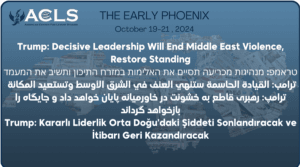Biden & Netanyahu at Odds Over Gaza War
TOP HEADLINES:
- U.S. Intel Report Says Netanyahu Could Lose Power
- Israel-Hizballah War Heats Up
- U.S.-Iraq Troop Talks Could Extend Beyond U.S. Election
- EU Mulls Sanctioning Iran for Giving Russia Missiles
- Turkiye Seeks Baghdad’s Agreement for Operations Vs. PKK
=======================
★ ISRAEL & PALESTINIAN TERRITORIES
U.S. Intelligence Report Says Netanyahu’s Hold on Power is Shaky–and Israel May Not Be Able to Finish Hamas.
The US intelligence community’s annual threat assessment report to Congress, published on Monday, asserts that Israeli Prime Minister Benjamin Netanyahu’s leadership is endangered by widespread public distrust. The report also criticizes Netanyahu’s military response, which it says has inflicted heavy civilian casualties in Gaza, and suggests his policies may not align with the Israeli public’s wishes. It also warns of prolonged armed resistance from Hamas and potential inspiration for future terrorist acts by al-Qaeda and ISIS. The report acknowledges that the majority of Israelis are in alignment with the Netanyahu government’s military actions in Gaza, even if most Israelis no longer support Netanyahu’s role as prime minister. The report predicts renewed large-scale protests against Netanyahu and projects that Netanyahu’s right-wing government will be replaced by a more moderate governing coalition.
Netanyahu Defies Biden’s Warning over Rafah Operation.
The public dispute between President Joe Biden and Israeli PM Benjamin Netanyahu escalated on Monday as the two leaders traded tense public statements. Biden stated he does not expect to meet Netanyahu or address the Israeli Knesset in coming days, indicating he is keeping the Israeli leader at arm’s length. Netanyahu on Monday said that while Biden and the Israeli government agree about the war’s basic goals, they do not agree about Rafah, and Israel would decide for itself how best to conduct the war, regardless of external pressure.
Qatar Says Hostage and Ceasefire Deal is Not Imminent.
Qatari spokesman Majed al-Ansari said on Monday that while Qatar remains hopeful for a Gaza ceasefire deal and is still working toward a permanent ceasefire, Hamas and Israel are not closing the gap between them in negotiations and no deal is imminent. He added that he could not offer a timeline for when talks might progress. The most recent deal on the table would have seen a six-week truce during which Hamas would release 40 Israeli hostages and Israel would release 400 Palestinian security prisoners.
Aid Ship Leaves Cyprus Bound for Gaza as UN Says Palestinians Are on Brink of Famine.
On Tuesday, a humanitarian mission embarked from Cyprus to Gaza, carrying 200 tons of essential supplies, including flour, rice, and protein, aboard the charity ship Open Arms. This pilot project, chiefly funded by the UAE and organized by a U.S.-based NGO, aims to establish a new sea route to deliver aid directly to the Gaza Strip, where the UN estimates a large portion of the population is reportedly on the brink of famine. The initiative comes as land aid deliveries face significant impediments due to bureaucratic red tape and the volatile security situation. It also coincides with U.S. military plans to construct a temporary port to deliver aid to Gaza.
Israel-Hizballah War Heats Up: IDF Strikes Hizballah Deep inside Lebanon; Hizballah Hits Northern Israel with 100 Rockets.
In a significant escalation in hostilities on Tuesday, the IDF struck Hizballah positions in Baalbek, deep inside Lebanon’s Bekaa Valley, killing one person. In response, Hezbollah launched 100 rockets towards the Golan Heights. The Israeli airstrikes targeted Hizballah’s “aerial unit” facilities, following drone attacks aimed at Israel. Despite the substantial Hizballah rocket barrage, there were no Israeli injuries reported, thanks to the effectiveness of the Iron Dome missile defense system. The IDF’s subsequent counter-strikes focused on three rocket launchers in southern Lebanon and two Hizballah command centers in the Baalbek area.
Iraqi Militias Send Armed Drone to Attack Ben Gurion Airport; Jordan Apparently Shoots Down Same Militia Drone.
The “Islamic Resistance in Iraq,” the label the Iranian-backed Iraqi militias apply to themselves, announced on Tuesday it had launched a drone strike on Ben Gurion Airport as an act of solidarity with Palestinians in Gaza. The attack was the latest in a series of strikes by Iraqi militias against Israel since October 7. At the same time, however, the Jordanian government announced it had shot down a drone over Irbid inside Jordanian airspace, probably the Iraqi militias’ attack drone on its way to Ben Gurion airport.
Israeli Forces Not Sure Yet Whether Strike Killed Hamas’s Number 3 Military Leader.
The IDF targeted Marwan Issa, Hamas’s deputy military commander, in a strike on a tunnel in Gaza on Monday, but it remains unclear if he was killed. The operation, part of efforts to target Hamas leadership, involved no hostages in the area. Issa, a significant figure in Hamas, is implicated in orchestrating a massacre in southern Israel that precipitated the current conflict. The IDF continues to assess the strike’s outcome and vows to pursue Hamas leaders responsible for the attack. Reports suggest five Palestinians were killed in the operation.
In Provocative Step, Hundreds of Israeli Settlers Enter Al-Aqsa Complex on Ramadan’s First Day.
On Tuesday, hundreds of Jewish settlers entered the Al-Aqsa mosque complex in East Jerusalem. The settlers entered through the Mugharbah gate under the protection of Israeli forces and during heightened security measures that restrict Palestinians’ access to the complext. The incursion followed Monday’s similar entrance of approximately 275 settlers to the same area. Taken together, the settlers’ marches will be viewed as a deliberate provocation by Palestinians and the broader Islamic world. Despite security restrictions, around 35,000 Palestinians managed to perform taraweeh prayers at Islam’s third holiest site on Monday night to mark the beginning of Ramadan.
=======================
★ IRAN
Iran, China, and Russia Launch Joint Naval Exercise in Northern Indian Ocean.
The exercise, named Maritime Security Belt, is starting Tuesday and will include surface and aerial units from the Iranian Navy and naval forces from China and Russia. Representatives from Oman, Azerbaijan, Kazakhstan, Pakistan, and South Africa will also participate. The main participants are billing the exercise as designed to enhance regional security, support international maritime trade, and counter piracy and terrorism, but it comes as Iran itself has become the main threat to shipping in the Red Sea region through its proxy attacks against international shipping.
European Union to Consider Measures Against Iran for Providing Missiles to Russia–as Tehran Chairs UN Conference on Disarmament.
The EU is considering taking new and significant measures against Iran following reports that Tehran might transfer ballistic missiles to Russia for use in the conflict against Ukraine. The draft conclusions for an upcoming summit express concern over Iran’s potential military cooperation with Russia, which is already deepened by the supply of drones and missiles. The EU plans to coordinate a swift response with international partners and has called for the preparation of further sanctions against Iran, alongside Belarus and North Korea, in response to these developments. Ironically, in light of the EU’s concerns, Iran will chair the UN Conference on Disarmament on March 18 and again from May 13 to May 24, 2024, a platform for international disarmament negotiations. The conference agenda includes nuclear arms race termination, disarmament, preventing nuclear war, and armaments transparency. Iran’s Foreign Minister criticized disarmament double standards, particularly concerning the Israeli regime, which he views as a global threat.
Biden Faces Pivotal Decision on Whether to Renew $10 Billion Sanctions Waiver for Iran.
Biden must decide this week whether to continue the waiver that allows Iraq to buy electricity from Iran and grants Iran access to $10 billion in Iraqi funds for “humanitarian goods,” avoiding U.S. sanctions. Critics argue the move could enable Tehran to support its proxies, while the effectiveness and specifics of Iran’s use of these funds remain largely undisclosed. The decision comes as Iran’s regional activities are under increasing scrutiny, not just relating to its support for Hamas in Gaza, but with the continued attacks by Tehran’s Houthi proxies against shipping in the Red Sea.
GOP Senator Blocks State Department Nominee to Demand Answers About Malley Investigation.
Republic Senator Jim Risch is blocking the nomination of Margaret Taylor to be the State Department’s legal counselor. Risch says he has been rebuffed by the State Department for six months as he demands transparency on the department’s suspension of Robert Malley, former U.S. special envoy for Iran, who is under FBI investigation for potentially mishandling classified documents. Risch is using Taylor’s nomination as leverage to obtain information about Malley’s security clearance suspension. The standoff reflects broader concerns over the State Department’s transparency and the implications of Malley’s actions on US-Iran policy.
=======================
★ YEMEN/RED SEA
Houthis Target Another Commercial Ship; U.S. Forces Launch 6 Strikes Against Houthi Targets.
The Houthi movement in Yemen declared they targeted a commercial ship named “Pinocchio” in the Red Sea, which they claimed was American. However, the US Central Command clarified that the vessel is actually owned by a Singaporean company and registered under a Liberian flag. This incident is part of the Houthis’ intensified military operations during Ramadan, aiming to escalate their activities. Despite the Houthis’ claim, the US Central Command reported that the attack did not result in any material damage or casualties to the vessel. In retaliation, US forces conducted strikes, destroying a Houthi-operated drone submarine and 18 anti-ship missiles in areas controlled by the Houthis on March 11. This event is set against a backdrop of heightened regional tensions, with the Houthis previously attacking and killing crew members of another ship and causing ships to reroute around Africa, significantly increasing shipping costs. Following the attack against “Pinocchio,” the United States carried out six defensive strikes in Houthi-controlled areas in Yemen, according to the US Central Command. These strikes destroyed a drone ship and 18 anti-ship missiles on Monday, after determining that Houthi weapons posed a threat to commercial and US naval ships.
U.S. and Gulf Allies Conclude Naval and Air Exercises in Kuwait.
On Tuesday, the United States, along with Britain and Gulf countries, completed naval and air exercises named “Ready Defenders” in Kuwait. These exercises, involving naval and air forces, aim to enhance the collective ability to address regional challenges. This development is part of the broader American-led initiative “Prosperity Guard,” initiated by the US Secretary of Defense to safeguard navigation in the Red Sea. The coalition includes Gulf nations, with some officially acknowledging their participation. The exercises underscore the United States’ effort to consolidate its regional alliance to respond to the increasing threat posed by Houthis militant attacks against American and Western naval vessels in the Red Sea.
=======================
★ IRAQ
U.S.-Iraqi Talks on Troop Presence Could Extend Past U.S. Presidential Election.
Talks between the U.S. and Iraq on ending the U.S.-led military coalition, formed in 2014 to combat ISIS, may extend beyond the U.S. presidential elections in November, according to an anonymous senior Iraqi official quoted by Reuters. Negotiations offer a pause from recent U.S. and Shi’ite armed group clashes, with Baghdad seeking to avoid becoming a battleground for foreign powers again. While hardline Shi’ite groups demand U.S. forces’ immediate exit, moderate factions and Sunni and Kurdish parties fear a power vacuum. The U.S. aims to reassess the coalition’s mission without necessarily withdrawing military advisers.
=======================
★ TURKIYE
UN Committee Says Turkish Airstrikes in Northeast Syria Could Be War Crimes.
The attacks targeted what Turkey claimed were military facilities of the Syrian Democratic Forces, as well as infrastructure for electricity and gasoline production, reportedly destroying 194 targets and eliminating 162 terrorists. The SDF’s self-administration reported over 200 sites were hit across the northeast during this period. The airstrikes also targeted residential areas, including a camp for internally displaced people, disrupting services provided by NGOs. There were no identified military targets near the attacked sites, raising concerns that these incidents may amount to direct attacks on civilians, potentially amounting to war crimes.
Turkiye Says It’s Countering Israeli “Disinformation” on Gaza.
Türkiye’s Communications Director Fahrettin Altun has highlighted the country’s efforts to counter nearly 200 disinformation attempts by Israel, especially regarding the ongoing conflict in Gaza. Speaking to Fokusplus, Altun emphasized the threat of disinformation as a national security issue and stressed the importance of truth in combating misinformation. He criticized the systematic use of disinformation by Israel to justify its actions in Gaza and underscored the media’s responsibility to report news ethically and impartially. Altun reaffirmed Türkiye’s commitment to supporting Palestine and bringing Israel’s alleged war crimes and atrocities to international attention.
Turkish Senior Officials Will Visit Baghdad to Discuss Actions Against PKK.
Türkiye’s top security and diplomatic officials, including Foreign Minister Hakan Fidan, Defense Minister Yaşar Güler, and National Intelligence Organization head Ibrahim Kalın, are set to visit Baghdad for talks on counterterrorism cooperation, particularly against the PKK terrorist group. Discussions will focus on establishing a joint operations center with Iraq for a more effective fight against terrorism and securing the Turkish-Iraqi border. This visit follows intensified diplomatic and military efforts by Türkiye to eliminate terrorist threats, underlining Ankara’s commitment to addressing terrorism at its source and ensuring national security without seeking permission from other countries. Türkiye earlier announced plans to establish a security belt 30-40 kilometers deep inside Iraq by summer to counter PKK attacks, echoing efforts in Syria. Turkish Defense Minister Yaşar Güler emphasized the initiative aligns with President Erdoğan’s strategy to secure borders and eliminate terrorism.
=======================
★ SYRIA
Swiss refer Syrian president’s uncle to trial for alleged war crimes over 4 decades ago.
Swiss federal prosecutors have indicted Rifaat Assad, former Syrian Vice President and uncle of Syria’s current president, on charges of war crimes and crimes against humanity. He allegedly ordered murder and torture in February 1982 during an attack in Hama to suppress a Muslim Brotherhood uprising, resulting in thousands killed. Although unlikely to serve time in Switzerland, the 86-year-old’s case, brought by Trial International under “universal jurisdiction,” signifies that war crimes can be prosecuted regardless of when they occurred, as long as the accused is alive.
Syrian Regime Disappointed by Reduction in Trade with Iran.
Despite Iran’s military, political, and economic support to Syria, trade between the two countries has not shown any positive signs, facing a “deep crisis.” Despite numerous agreements, trade and economic relations remain low, with Iran exporting goods worth $244 million last year, decreasing to $120 million this year. Officials from both countries express disappointment over the low level of economic relations, despite their strategic military and political ties. Challenges include administrative issues, sanctions, logistical difficulties, and a unilateral trade approach by Iran, aiming to dominate the Syrian market without offering significant benefits to Syrian traders.
=======================
★ EGYPT
Will UAE’s $35B investment help Egypt recover from financial crisis?
The U.S.-based media outlet Al Monitor notes that the UAE has pledged a $35 billion investment to aid Egypt’s faltering economy, with President Abdel Fattah al-Sisi’s government benefiting from this economic lifeline. Following a historic deal focusing on the development of the Ras el-Hekma area, Egypt’s Central Bank introduced measures including floating the local currency and securing an increased IMF bailout loan from $3 billion to $8 billion. These steps, part of broader economic reforms, aim to alleviate Egypt’s foreign currency shortage, which has impacted business activities and commodity imports, with $10 billion of the UAE’s investment already received.



